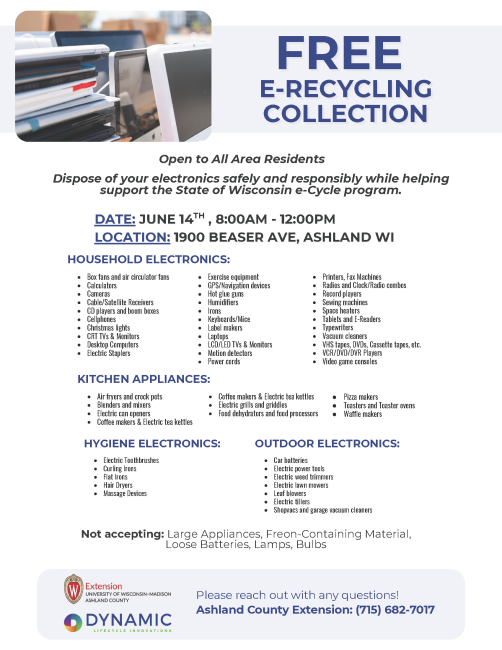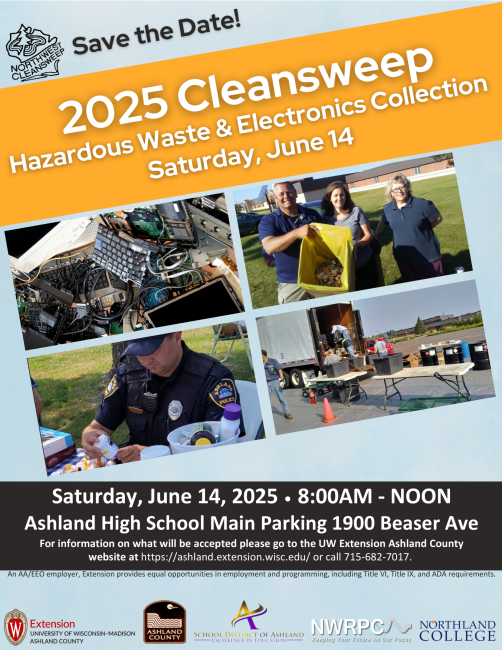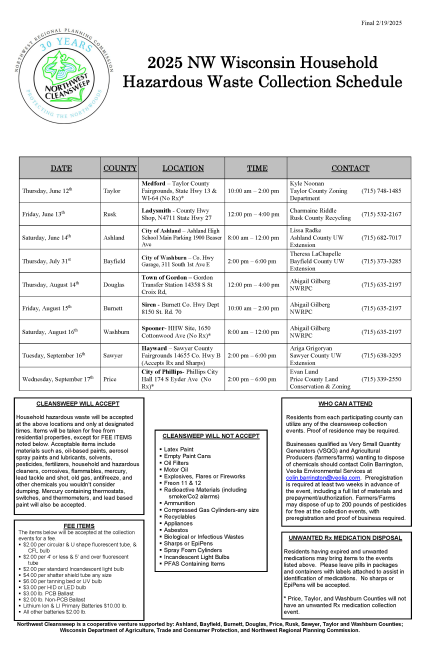Cleansweep Hazardous Waste Management
With the support of Ashland County government and in partnership with the Northwest Regional Planning Commission, the Extension Ashland County office coordinates an annual hazardous waste collection called ‘Clean Sweep.’ The Northwest Regional Planning Commission offers the annual Cleansweep Collections at no or low cost to households, farms, and businesses in a nine-county region since 1995.
Save the Date for the 30th Anniversary of Cleansweep!
All Cleansweeps residents, farms, businesses, and communities are welcome to attend any event in any of the 9 participating counties as often as needed, including Ashland, Bayfield, Burnett, Douglas, Price, Rusk, Sawyer, Taylor, and Washburn counties.
Saturday, June 14, 2025
8:00AM – 12:00PM
Ashland High School’s Main Parking Lot, 1900 Beaser Avenue

Example Items – NO CHARGE for these items
- Oil-based paints
- aerosol spray paints and lubricants
- solvents
- pesticides
- fertilizers
- household and hazardous cleaners
- corrosives
- flammables
- mercury
- lead tackle and shot
- old gas
- antifreeze
- other chemicals you wouldn’t consider dumping
- Mercury containing thermostats, switches, and thermometers, and lead based paint will also be accepted.
Electronics Accepted in 2025
- fans
- calculators
- cameras
- cable/satellite receivers
- cd players, radios, clocks, record players
- cellphones
- christmas lights
- CRT & LCD/LED tvs & monitors
- computers & computer equipment, tablets, e-readers
- exercise equipment
- humidifiers & space heaters
- power cords
- air fryers and crock pots
- blenders and mixers
- coffee makers
- electric grills
- food dehydrators and food processors
- pizza makers and waffle irons
- toasters and toaster ovens
- electric toothbrushes
- curling irons, flat irons, hair dryers
- massage devices
- car batteries
- electric power tools, weed trimmers, lawn mowers
- leaf blowers
- shopvacs
Fee Items – There is a charge for these items
- $2.00 per circular & U shape fluorescent tube, & CFL bulb
- $2.00 per 4′ or less & 5’ and over fluorescent tube
- $2.00 per standard Incandescent light bulb
- $4.00 per shatter shield tube any size
- $6.00 per tanning bed or UV bulb
- $3.00 per HID or LED bulb
- $3.00 lb. PCB Ballast
- $2.00 lb. Non-PCB Ballast
- $10.00 lb. Lithium Ion & LI Primary Batteries
- $2.00 lb. All other batteries
Cleansweep Will Not Accept
- Latex paint
- Empty paint cans
- Oil filters
- Motor oil
- Explosives, flares or fireworks
- Freon 11 & 12
- Radioactive materials including smoke/Co2 alarms
- Ammunition
- Compressed gas cylinders of any size
- Recyclables
- Appliances
- Asbestos
- Biological or Infectious Waste
- Sharps or Epi-Pens
- Spray foam cylinders
- Incandescent Light Bulbs
- PFAS Containing Items
- Construction waste
Resources for Household Hazardous Waste Management
- The Ashland County Household Hazardous Waste Disposal Guide is organized by type of waste and includes local businesses that will accept waste. This guide is updated annually, but be sure to call businesses ahead of time to see if they are accepting items.
- WI DNR Household Hazardous Waste Management page will show you information on reducing waste and disposing waste in different categories. This information is also available on their page as a (PDF Pamphlet)
Before Cleansweep: Webinars with Experts
How and Why to Dispose of Hazardous Waste
The program is about 45 minutes long.
Join our Community Development Educator Lissa Radke and Sheldon Johnson, the executive director of Northwest Regional Planning Commission, as they talk about how to dispose of toxic materials at 9 community collections events in 2023.
You’ll learn why an annual Cleansweeps collection event was started, what’s acceptable and what’s not, where to take materials throughout the year in Ashland County, and how to avoid hazardous materials by choosing safe alternatives.
Green Your Life: Reduce Your Use of Hazardous Materials!
You can view a recording of this webinar on YouTube by following this link
The program is co-hosted by UW Madison Division of Extension-Ashland County, the Environmental Assistance Program at Wisconsin Department of Natural Resources, and Veolia Environmental Services-North America.
All of us have it stored on shelves in our basements, garages, barns, out buildings, and other places–hazardous materials. Unused oil paint, old farm chemicals, toxic cleaners, burned out batteries and light bulbs. In this one-hour webinar, we’ll learn what happens to those products after you take them to a local Cleansweep collection. And, we’ll learn how to avoid even using hazardous materials by purchasing safe products instead. The webinar is free and open to the public including members of households, farms, businesses, schools, and municipalities but pre-registration is required.
-Renee Bashel is the Small Business Environmental Assistance Program Manager at the WI DNR’s Environmental Assistance Program in Madison. She will talk about how to read labels to see if something it harmful before it’s purchased. She specializes in helping businesses and farms reduce their wastes, but will also talk about choosing safer household products. Renee shared her PowerPoint presentation so you can learn how to read a product label and access the resource links she recommended to find safe products and items.
-Two employees with Veolia Environmental Services-North America will describe how the hazardous products brought to Cleansweep sites are disposed of, whether through reuse, recycling, industrial incineration, or controlled landfilling. Josh Harmelink and Pat Baskfield establish and operate Cleansweep collection events all over Wisconsin—about 150 events a year! Veolia is a private company that has been working with municipalities, states, and large corporations to operate Cleansweep and other events for 40 years. They’ve been contracted by the Northwest Regional Planning Commission to process all 9 participating counties’ Cleansweep materials since 2020.
More Resources
-Latex paints and water-based stains are not accepted at Cleansweeps since they’re not considered hazardous. Here’s a short video showing how to safely dispose of latex paint and cans.
-A wide variety of statewide recycling and waste management information is available from the UW Solid and Hazardous Waste Education Center.
-For medium to large quantities of materials to recycle on your time schedule check Waste Management’s LampTracker which offers environmentally friendly, safe, and simple recycling solutions for fluorescent lamps, dry cell batteries, lighting ballasts, mercury devices, computers, electronics, sharps, bottles, cans, and paper, the cost includes pre-paid mailing.
–WDNR’s Small Business Assistance Center: Confused by environmental regulations? Wondering where to go for help? WDNR has tools to help you make sure you’re doing the right thing for your business and the environment.
-The US Environmental Protection Agency’s web site is a great place to learn what is/isn’t hazardous, handling household hazardous waste, as well as how to purchase or make your own safe alternatives instead of buying toxic products
-The Environmental Working Group is a nonprofit organization that identifies which products are truly safe and which are not safe to use, especially cleaners. See their Wallet Guide for Healthy Cleaning here.
Veolia takes care of the waste during and after the collection event,
“We’ve helped over 2,500 communities across the United States organize, promote and implement convenient household hazardous waste collection programs to assure that these wastes are managed safely and in the most environmentally responsible manner. Your participation helps reduce your carbon footprint, while protecting human health and the environment”.
Veolia North America’s Household Hazardous Waste Management Page
HAVE A QUESTION?

Lissa Radke serves Ashland County as the Community Development Educator. To learn more about Community Development Programming and the role of Extension in Ashland County, send an email to lissa.radke@wisc.edu or call the Ashland County office at 715-682-7017.



